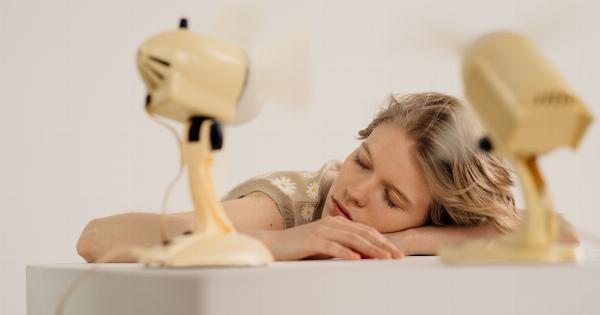Sleeping with a fan on is a common practice for many people, especially during hot summer nights. However, recent studies show that sleeping with a fan on can actually have negative effects on your health.
While a fan may seem like a harmless appliance, it can cause a range of health problems that you may not be aware of. In this article, we will explore why sleeping with a fan on can be harmful to your health.
1. Asthma Attacks
If you suffer from asthma, sleeping with a fan on can make your symptoms worse. A fan circulates air around your room, which can cause dust and other allergens to become airborne. This can trigger an asthma attack or make an existing one worse.
If you have asthma, it’s best to sleep in a room that is well-ventilated but doesn’t have a fan blowing on you.
2. Dry Skin
Another reason why sleeping with a fan on can be harmful to your health is that it can cause dry skin. When cold air blows on your skin for an extended period, it can cause your skin to dry out.
This is especially true if you sleep with a fan blowing directly on your face. To avoid dry skin, try not to sleep with a fan blowing directly on your skin.
3. Sore Muscles
If you sleep with a fan on, you may wake up with sore muscles. This is because the cool air blowing on your body can cause your muscles to tense up. This can cause them to become stiff and sore in the morning.
If you often wake up with sore muscles, try sleeping without a fan for a few nights to see if it makes a difference.
4. Dehydration
Another negative effect of sleeping with a fan on is dehydration. Fans circulate air, which can cause moisture to evaporate from your body at a faster rate. This can cause dehydration, especially if you sleep with a fan on in a room that is already dry.
To avoid dehydration, try to keep a glass of water nearby while you sleep.
5. Sinus Problems
If you suffer from allergies or sinus problems, sleeping with a fan on can cause your sinuses to become blocked. The circulating air can cause pollen, dust, and other airborne particles to become trapped in your sinuses.
This can cause inflammation and other sinus problems. If you have sinus problems, it’s best to avoid sleeping with a fan on.
6. Headaches
If you often wake up with headaches, sleeping with a fan on may be the culprit. The cool air blowing on your face can cause your sinuses to become congested, which can cause headaches.
If you suffer from headaches, try sleeping without a fan for a few nights to see if it makes a difference.
7. Throat Irritation
Sleeping with a fan on can also cause throat irritation. This is because the circulating air can dry out your throat, causing it to become scratchy and irritated.
If you often wake up with a sore throat, try sleeping without a fan for a few nights to see if it makes a difference.
8. Eye Irritation
If you sleep with a fan on, you may also wake up with irritated eyes. This is because the circulating air can cause your eyes to become dry and irritated.
If you often wake up with red, itchy eyes, try sleeping without a fan to see if it makes a difference.
9. Increased Allergy Symptoms
If you suffer from allergies, sleeping with a fan on can make your symptoms worse. The circulating air can cause pollen, dust, and other allergens to become airborne, which can trigger an allergic reaction.
If you suffer from allergies, it’s best to avoid sleeping with a fan on.
10. Noise Pollution
Finally, sleeping with a fan on can cause noise pollution. Fans can be noisy, which can disrupt your sleep and make it difficult to fall asleep. This can lead to sleep deprivation, which can have negative effects on your health.
If you have trouble sleeping with a fan on, try sleeping without one.
In conclusion, sleeping with a fan on may seem like a harmless habit, but it can have negative effects on your health. From asthma attacks to dry skin, sore muscles, and dehydration, the risks outweigh the benefits.
If you want to improve your sleep quality and overall health, it’s best to avoid sleeping with a fan on.































